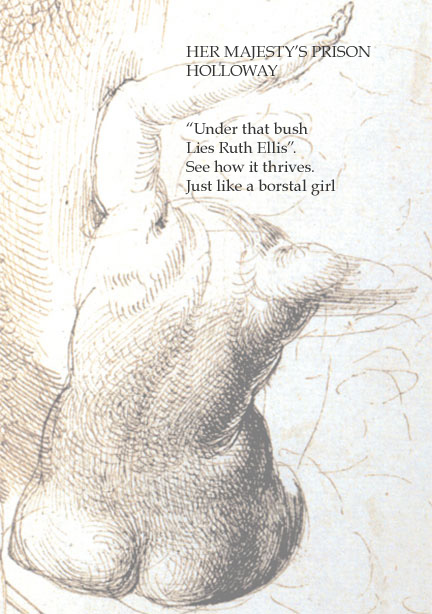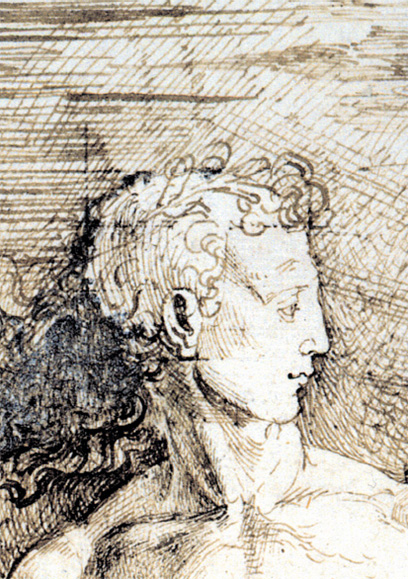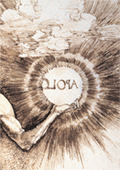|
|
CENTAURS
The Lapiths say that man cannot be horse,
Four legs instead of two’s the mark of greed,
As taller’s not to say a higher creature:
Whose life is crude, whose mansion is a stable,
Whose head is never pillowed day or night.
Not out of envy but afraid of centaurs.
Beings should not be born of greater speed,
Or further reach, more limbs, of dual nature;
Like Chiron, riven, yet to die – unable.
Passionate, loving and nonplussed with might.
Open or hid, there’s violence in force.
In any case, a centaur cannot breed,
Is never young, may sometimes be the teacher -
Servant to hero-man, but eats at another table;
Is dangerous when drunk, has enemies to fight.
Enemy Lapiths. Lapiths have their laws
And censure centaurs for some wicked deed
Of posthumous murder, ferry overreacher.
Beauty’s unsafe with centaurs, runs the fable,
And even when they die, their blood can bite.

|
|
AFTERWARDS
“When death is over, mother,
how do wings grow on the dead?”–
“The back becomes so broad,
a man must bow his head.
A weight as of a mountain
sets a hump upon his back;
ribs and sides are bursting,
muscles crack.
Till with sudden start
he straightens and is tall.
He can carry all.
The dead know then
that they live again”.
(after Karin Boye 1900-1941)

|
|
FIR TREE
Tall-standing fir-tree
Whose leaves are as fast
And true to their being
As shade is to mine
Not just in summer
Splay your green hands –
In winter’s kill-colour
Living as spring.
Dark-fingered fir-tree
Drawing the eye
In festival trim
To greet the new sun
The joy of a child
Returns at the sight
Of your limbs graced
With gifts as with jewels.
Straight-needled fir-tree
Among many turn-coats
Raising a standard
Of durable hope:
Not to give death
More than his due
But live undiminished
By world and by weather.
 |
|
PROMETHEUS
Clutter with blowsy smoke, old Zeus
Your heaven not in sight;
And like a brat who lops
The heads from thistles (why?)
Pitting your cheap might
On oaks and mountain-tops
You needn’t think to loose
My ground from under me;
My fire, my roof-tree
You need not hope to snuff:
These that you envy me
I shall keep fast enough.
You dregs that some call gods
Eke out your lousy lives
On gabbled windy words
And greasy blackened offal.
But for the crazy hopes
Of cadgers and of dopes
Wouldn’t you simply starve?
Once childish and despairing
I also looked to the sun
Expecting in my plight
That it would hear my plea
And feel my pain with me
And comfort me or aid.
And yet I was alight
With gratitude to you:
That innocent betrayed
Gave thanks to you old snorers
In your unfeeling sky!
Why should I honour you?
For me, what have you done?
When I was mad with hurts
Or sunk in dwarfing fears
What comfort did you give?
You never dried my tears!
Wasn’t it time and fate
(Which are your rulers too)
Which pulled me from the grate
And made a man of me?
Because my garden fancies
Never came to flower
Did you think I’d go
To the wilderness to glower
Over a life gone sour –
Which contrast but enhances?
I sit here now and fashion
A race of men like me
Joy and tears and passion
Are of the recipe
But most of all, aware
Of life, their minds are free
Of you. And so am I
And so will always be.
(after Goethe 1749-1832)

|


|
|
THE ADVANCE ON THE RETREAT
When the city had passed me, my feet took a course that was gentle
To a field that was empty, and full of the colour of green;
Spread with remembrance, enamelled with various liking,
Where even the ditches are clear enough trenched to be trusted;
Hedge-rows grow neatly, and cleanly the gate hangs on hinges
In order so careful it leaves no location for longing.
The city was daunting, and tortured with hope and with longing;
The barkers were fierce there and slopes too afraid to be gentle;
The arches were falling and every door shrieked on its hinges,
To relief of staccato, this world here’s a cadence of green;
The footing of silence on turf makes a place to be trusted,
While the grass has the ease and the spring of immediate liking.
The buttercups shine like small suns of intemperate liking
Which eat up the eye and yet manage to discipline onging,
Fulfilling all promise of riches with gold to be trusted
They gladly and smugly reflect back a light that is gentle
And even their scissor-torn leaves are a sureness of green:
The soil of this meadow is scented, the air moves on hinges.
The way to the meadow is easy, there’s oil on the hinges.
The only requisite is: giving up loving for liking.
And yet of all the colours I fear most this marvelous green:
A colour that harms you and cheats you with satisfied longing,
With turning a passion that’s fierce to a kindness that’s gentle
(If the kindness of lovers were ever the kind to be trusted).
The cry of the city was: only despair can be trusted:
A point is well taken when reason is shorn off its hinges
And levity grows in a field that is sunny and gentle.
The days trickle past and at length I am stifled with liking.
I seek for an answer that never can answer my longing:
To mow with a sickle that’s sharper than this tender green.
By staring at scarlet you find it’s the obverse of green.
Look here and away, and which is the hue to be trusted?
To feed on bright scarlet with never a hope of belonging
You batter your head on a door without handles or hinges.
The entry to either recourse is too dear for my liking:
When wish-horses couple with nightmares they breed nothing gentle.
This tells me that gentleness is not the nature of green.
When I proffer my liking I know that it should be mistrusted.
All blame but my own comes from hinging my loving on longing.
(For the author's notes on the sestina form of this poem please refer to Sestina.)

|
|
|
LIKE A MEANING
Art, as I take it, being a Mad Tea-Party–
Encyclical recurrent dream in which
The unexpected still picks bones with time,
Where persons of some dignity and place
Pursue their self-locked patterns:
Formal throughout suspended afternoons.
Very unlike that other tea-party
Which I could never stomach;
For why should child or adult anyhow
Take joy in seeing human manners aped?
Applauding their own echoes to the bounds
In superficial appearances
Of real chimpanzees.
Yet now I trace the lineaments of art
In the crude antics of primatial life,
To welcome, like a meaning, the occasional
Clumsy correspondence of effect!

|
|
THIS WOODEN O
Nought my initial
Nothing I am sexed
Nought exceeds something
Nothing be my text
Nought is a muchness
Naked in a well
Nought is a number
Counting cannot tell
The imperative ought
How strait is that road
Must be given, shall be given
That which is owed
Some people see nought
Go down with Alice.
Love is the tennis term
Hard by a palace.
Mathematicians
A cipher long sought
For nothing is possible
Without the nought
Know nothing well
As thyself, friend
Lear did it too
At the very end.
Even teak yields
Finally to bend
All creation grow
Within this wooden O

|

|
|

![]()

